Black fruit is a fascinating category of fruits that offer a wide range of health benefits. From the miracle fruit with its ability to make sour foods taste sweet, to the peanut butter fruit with its jam-like consistency, and the dabai fruit known for its olive-like flavor, there’s so much to discover in the world of black fruit.
Key Takeaways:
- Black fruit offers a wide range of health benefits.
- Miracle fruit can alter taste buds and make sour foods taste sweet.
- Peanut butter fruit has a jam-like consistency and unique flavor.
- Dabai fruit offers a taste reminiscent of olives and brie cheese.
- Incorporating black fruit into your diet can enhance overall wellbeing.
The Miraculous Miracle Fruit
The miracle fruit, also known as the miracle berry, is an evergreen shrub native to tropical West Africa. It produces small fruits that contain a glycoprotein called miraculin. This protein binds to taste bud receptors and causes sour foods to taste sweet. The effect of miraculin typically lasts for up to two hours, making it a fascinating natural phenomenon.
Researchers have discovered that the taste-altering properties of the miracle fruit could have potential benefits for chemotherapy patients. Chemotherapy often causes taste changes, making food taste metallic or bland. By consuming the miracle fruit before meals, patients may be able to enjoy a more pleasant and flavorful dining experience, thereby increasing their appetite and overall well-being.
The use of the miracle fruit isn’t limited to taste alteration for medical purposes. It can also be a fun and unique experience for taste testing parties or adding an exciting twist to culinary creations. The miracle fruit plant can even be grown as a bonsai tree, adding aesthetic appeal to any garden or indoor space.
“The miracle fruit’s ability to make sour foods taste sweet is a true wonder of nature, and it offers a world of possibilities for taste exploration and culinary adventure.”
The Miraculin Phenomenon
The miraculous taste-altering properties of the miracle fruit can be attributed to the glycoprotein miraculin. Miraculin binds to the taste bud receptors, specifically the receptors responsible for perceiving sourness. Once bound, the miraculin alters the receptor’s response to acids, making the sour taste receptors perceive as sweet. This temporary alteration creates a delightful experience, transforming typically sour foods into sweet treats.
It’s important to note that while the miracle fruit can make acidic foods taste sweet, it doesn’t change the actual pH of the food or the acidity itself. The taste alteration is purely a sensory experience, fooling the taste buds into perceiving sweetness in sour foods.
| Benefits of Miracle Fruit | Chemotherapy Patients |
|---|---|
| Enhances dining experience | Counteracts metallic taste |
| Fun taste testing activity | Increases appetite |
| Unique ingredient for culinary creations | Improves overall well-being |
The miraculous taste-altering properties of the miracle fruit make it a captivating fruit that offers a unique and enjoyable experience. Whether used for its potential benefits in taste alteration for chemotherapy patients or as a fun and exciting culinary ingredient, the miracle fruit continues to surprise and delight those who encounter its remarkable effects.
Indulge in the Peanut Butter Fruit’s Jam-Like Goodness
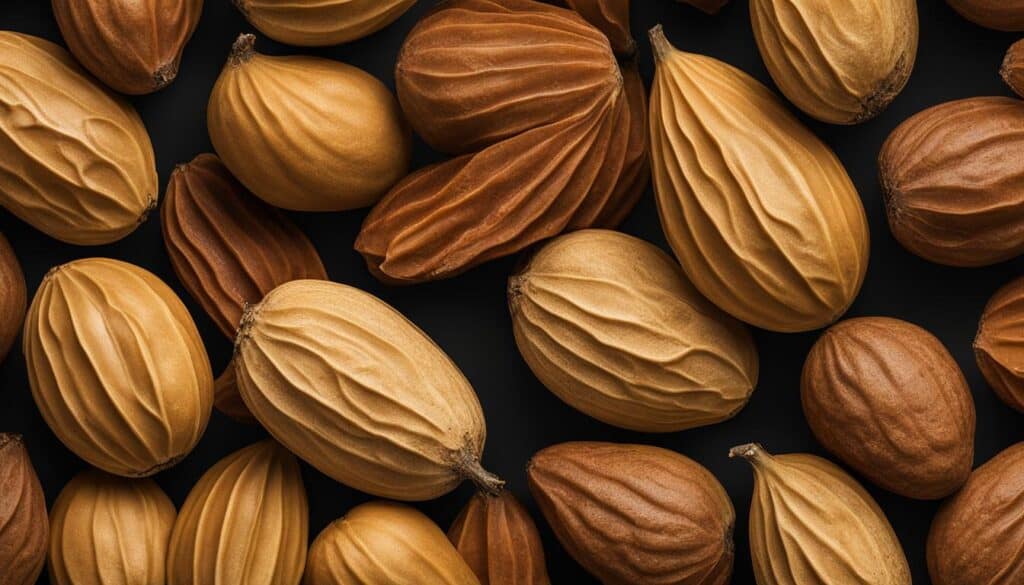
The peanut butter fruit, also known as Rosenbergiodendron formosum, is a unique black fruit that offers a delightful and jam-like taste. Native to Panama, Venezuela, Colombia, and Ecuador, this fruit comes from a flowering bush that can also be cultivated as a bonsai tree. The fruit itself has a black, sticky goop with small seeds mixed in, which gives it its distinctive texture and appearance.
What makes the peanut butter fruit truly special is its flavor profile. It has a sweet, floral taste with a slight bitterness and notes of honey and molasses. The combination of these flavors creates a truly unique culinary experience. The fruit can be enjoyed by spreading it over bread or crackers, similar to peanut butter, or used as a jam substitute in various recipes.
Overall, the peanut butter fruit offers a one-of-a-kind taste that is sure to delight your taste buds. Its black, sticky goop and unique flavor make it a fascinating addition to the world of black fruit. So why not indulge in the jam-like goodness of the peanut butter fruit and explore the wonderful flavors it has to offer?
Table: Comparison of Black Fruits’ Flavor Profiles
| Black Fruit | Flavor Profile |
|---|---|
| Miracle Fruit | Sour foods taste sweet |
| Peanut Butter Fruit | Sweet, floral, slightly bitter with notes of honey and molasses |
| Dabai Fruit | Buttery pulp with olive-like flavor |
The Unique Flavors of the Dabai Fruit
The dabai fruit, native to Borneo, offers a unique taste experience. Its black and shiny skin encases a contrasting yellow pulp. To fully enjoy the fruit’s flavors, there is a slight learning curve in its preparation. The dabai fruit needs to be soaked in hot water, which softens the texture and enhances the taste. Once prepared, the buttery pulp delights the palate with a combination of flavors, reminiscent of buttered carrots with a hint of olives and brie cheese. The edible kernel inside the fruit adds a nutty element, much like almonds.
The contrasting flavors and textures of the dabai fruit make it a true delight for culinary enthusiasts seeking new taste adventures. Its black and shiny exterior attracts attention, and once opened, the vibrant yellow pulp is revealed, inviting curiosity and exploration. The complex flavors of the buttery pulp and nutty kernel create a delightful interplay that showcases the unique characteristics of this fruit.
“The dabai fruit’s flavors take some getting used to, but once you acquire a taste for it, you’ll find it absolutely irresistible. The buttery pulp combined with the nuttiness of the kernel creates a delightful and satisfying experience.”
Unique Characteristics of the Dabai Fruit
- Black and shiny skin that adds visual appeal.
- Buttery pulp with flavors of buttered carrots, olives, and brie cheese.
- Nutty kernel reminiscent of almonds.
| Characteristic | Description |
|---|---|
| Color | Black and shiny |
| Pulp Texture | Buttery |
| Pulp Flavor | Buttered carrots with hints of olives and brie cheese |
| Kernel Flavor | Nutty, similar to almonds |
Nutritional Benefits of Black Fruit
Black fruit is not only delicious but also nutritious. These fruits are packed with essential nutrients that contribute to various health benefits, making them a valuable addition to a well-balanced diet. Let’s explore the nutritional benefits of black fruit:
1. High in antioxidants
Black fruit is rich in antioxidants, which help protect the body against harmful free radicals. Free radicals can cause oxidative stress, leading to chronic diseases and aging. Antioxidants neutralize these free radicals, reducing the risk of inflammation and promoting overall health.
2. Excellent source of vitamins
Black fruit is a great source of vitamins, including vitamin C and vitamin A. Vitamin C is essential for a strong immune system and collagen production, while vitamin A supports vision and healthy skin. Incorporating black fruit into your diet can help meet your daily vitamin requirements.
3. Fiber-rich
Black fruit is also high in dietary fiber, which aids in digestion and promotes a feeling of fullness. Fiber helps regulate bowel movements, prevents constipation, and supports a healthy digestive system. Including black fruit in your meals or snacks can contribute to a well-functioning digestive tract.
By consuming black fruit, you can support your immune system, promote heart health, aid digestion, and enjoy a wide range of essential nutrients. Whether you prefer blackberries, black currants, or other black fruit varieties, these flavorful fruits offer both taste and health benefits.
| Nutrient | Blackberries (per 100g) | Black Currants (per 100g) | Black Grapes (per 100g) |
|---|---|---|---|
| Calories | 43 | 63 | 69 |
| Vitamin C | 21mg | 181mg | 3.2mg |
| Vitamin A | 214IU | 1080IU | 66IU |
| Fiber | 5.3g | 4.3g | 0.9g |
Table: Nutrient comparison of blackberries, black currants, and black grapes
As shown in the table, blackberries and black currants are particularly high in vitamin C. Black currants stand out with their significantly higher vitamin C content compared to the other black fruit varieties. Additionally, blackberries and black currants are both excellent sources of dietary fiber, contributing to healthy digestion.
Seasonality and Varieties of Black Fruit
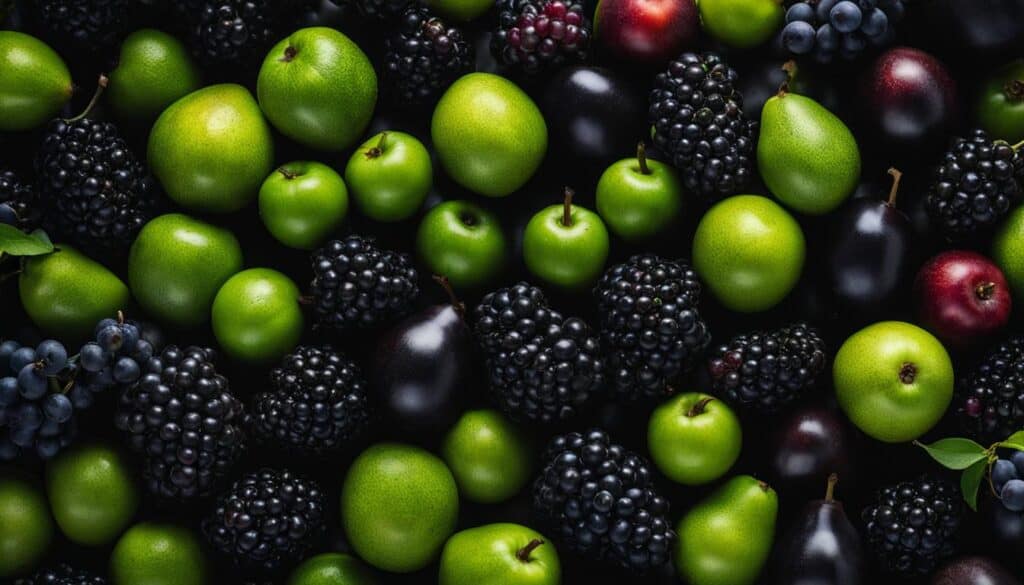
When it comes to black fruit, the seasonality and varieties can vary depending on your location and the climate. Some black fruits are available year-round, while others have specific seasons that make them even more special. If you’re a fan of tropical and exotic fruits, you’ll be delighted to know that many of them fall into the black fruit category, offering a unique taste experience.
Availability plays a significant role in enjoying black fruits at their freshest. Below is a table showcasing some popular black fruit varieties, their seasonality, and a brief description of their flavors:
| Black Fruit Varieties | Seasonality | Description |
|---|---|---|
| Durian | Year-round in tropical regions | A pungent and creamy fruit with a custard-like texture. It is often regarded as the “king of fruits” in Southeast Asia. |
| Blackberries | Summer to early fall | Small, sweet, and tart berries with a dark purple hue. They are perfect for snacking, baking, or adding to smoothies. |
| Black grapes | Summer to early fall | Juicy and sweet grapes with a deep purple or black color. They are enjoyed fresh, in salads, or turned into jams and wines. |
These are just a few examples of the diverse black fruit varieties available. Keep in mind that availability may vary depending on your local grocery stores or farmers’ markets. Exploring the different varieties can be an exciting way to add variety to your diet and discover new flavors.
Embrace the Exotic with Black Fruits
Black fruits not only offer a unique taste experience but also allow you to embrace the exotic. Many black fruits have roots in tropical regions and bring a touch of the exotic to your plate. Whether it’s the creamy and pungent durian or the sweet and tart blackberries, each black fruit provides a delicious adventure for your taste buds.
The flavors of black fruits can transport you to lush tropical landscapes and evoke a sense of adventure.
So, the next time you visit your local grocery store or farmers’ market, keep an eye out for the black fruit section. Try something new, indulge in the exotic, and let the flavors of black fruits take you on a culinary journey.
Delicious Recipes with Black Fruit
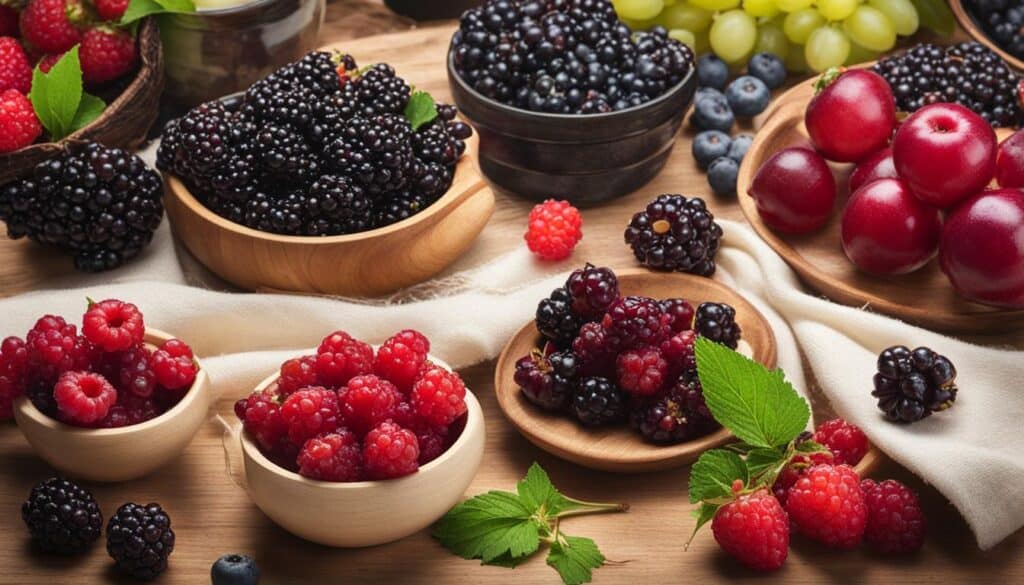
Black fruit is not only a feast for the taste buds but also a versatile ingredient in various culinary creations. Whether you’re craving something sweet or looking for a way to add a unique twist to your dishes, black fruit can be your go-to ingredient. From desserts to smoothies, salads, and even jams, there are endless possibilities when it comes to incorporating black fruit into your culinary adventures.
One popular way to enjoy the rich flavors of black fruit is through desserts. Blackberry pie, featuring sweet and tangy blackberries, is a classic favorite. You can also make a delectable black fruit crumble by combining different varieties such as blackberries, black currants, and black cherries with a buttery, crumbly topping. For a refreshing treat, try making black fruit popsicles by blending blackberries, blueberries, and black grapes with a hint of lemon juice and freezing the mixture in popsicle molds.
If you’re a fan of smoothies, black fruit can add depth and richness to your favorite blends. Combine blackberries, raspberries, and a ripe banana with almond milk for a creamy and nutritious smoothie. For a tropical twist, blend black grapes, pineapple chunks, and coconut water for a refreshing black fruit smoothie with a hint of exotic flavors. Adding black fruit to your smoothies not only enhances the taste but also boosts their nutritional value with added antioxidants and vitamins.
| Dish | Ingredients | Instructions |
|---|---|---|
| Blackberry Pie | 2 cups blackberries, 1 cup sugar, 1/4 cup flour, 1 tablespoon lemon juice, 1 pie crust |
|
| Black Fruit Smoothie | 1 cup blackberries, 1/2 cup black grapes, 1 ripe banana, 1 cup almond milk |
|
| Black Fruit Salad | 1 cup blackberries, 1 cup black cherries, 1 cup black grapes, 1 tablespoon honey, 1 tablespoon lemon juice |
|
Salads can also benefit from the addition of black fruit. Toss blackberries, black grapes, and crumbled feta cheese with baby spinach or mixed greens for a vibrant and flavorful salad. Drizzle with a balsamic vinaigrette for a tangy finish. You can also add blackberries and blueberries to a quinoa salad for a nutritious and colorful side dish.
Lastly, black fruit can be transformed into delicious homemade jams that can be enjoyed on toast, paired with cheese, or used as a filling for pastries. Combine blackberries, sugar, and lemon juice in a saucepan and simmer until the mixture thickens and reaches a jam-like consistency. Let it cool before transferring it into sterilized glass jars. The sweet and tangy flavors of black fruit jam will surely elevate your breakfast or snack time.
Overall, black fruit is a versatile ingredient that can be used to create a wide range of culinary delights. Whether you’re satisfying your sweet tooth with desserts, refreshing your palate with smoothies and salads, or indulging in homemade jams, black fruit adds a burst of flavor and visual appeal to your dishes. So, go ahead and explore the numerous black fruit recipes available to unlock a world of taste sensations.
Unleashing the Power of Black Fruit
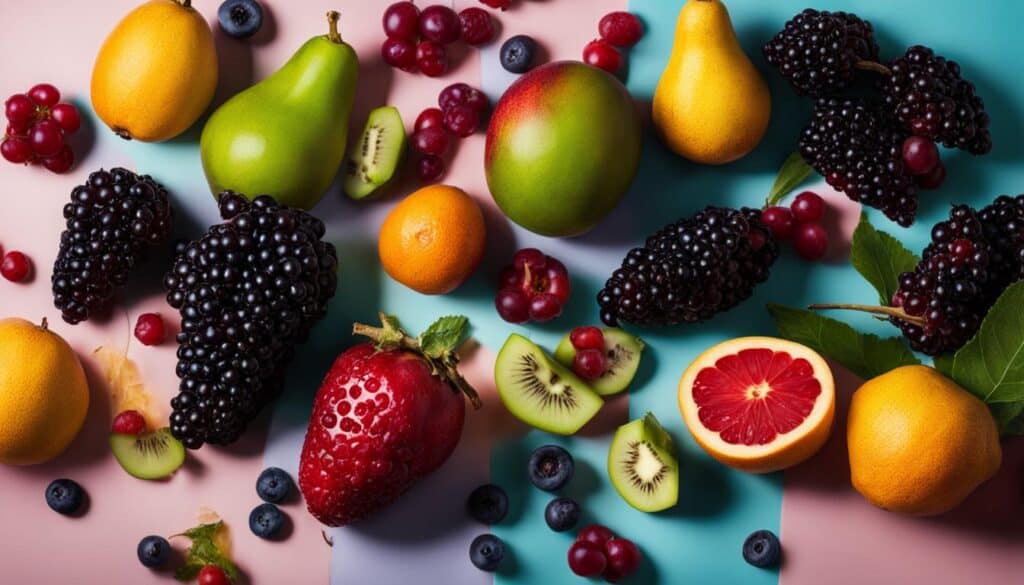
Black fruit not only tantalizes taste buds with its unique flavors but also boasts a multitude of health benefits. The rich antioxidant content found in black fruit can help combat free radicals and reduce inflammation, making it a powerful ally in disease prevention. Antioxidants play a crucial role in neutralizing harmful free radicals that can cause cellular damage and contribute to chronic conditions such as heart disease, cancer, and aging-related diseases.
By including black fruit in your diet, you can take advantage of these health benefits while savoring the delightful flavors they offer. Whether enjoyed fresh or incorporated into various recipes, black fruit can be a delicious and nutritious addition to your daily meals. With their vibrant colors and robust profiles, black fruits such as miracle berries, peanut butter fruit, and dabai fruit provide an array of flavors that can enhance your culinary adventures and support your overall well-being.
When it comes to black fruit, the antioxidants found within are the true superheroes. These powerful compounds help protect our bodies from oxidative stress and inflammation, which are underlying factors in many chronic diseases. So, the next time you savor the succulent sweetness of a blackberry or revel in the rich flavors of a ripe fig, know that you’re not only experiencing a taste sensation but also nourishing your body with a potent dose of disease-fighting antioxidants.
Exploring the Antioxidant Power of Black Fruit
Research has shown that black fruits, such as blackberries, blueberries, and black grapes, are particularly rich in anthocyanins, a type of antioxidant that gives these fruits their dark hue. Anthocyanins have been associated with numerous health benefits, including cardiovascular health, brain function, and cancer prevention. These antioxidants help protect cells from damage, reduce inflammation, and support the immune system.
| Black Fruit Variety | Antioxidant Content |
|---|---|
| Blackberries | High |
| Blueberries | High |
| Black Grapes | High |
| Blackcurrants | High |
| Black Cherries | Moderate |
| Elderberries | Moderate |
As seen in the table above, blackberries, blueberries, black grapes, blackcurrants, black cherries, and elderberries are among the black fruits with the highest antioxidant content. Including these fruits in your diet can provide a delicious way to harness the power of antioxidants and promote optimal health.
So, why not indulge in the flavorsome delights of black fruit today? From fresh blackberries in a summer salad to a glass of antioxidant-rich black grape juice, there are countless ways to incorporate these vibrant fruits into your daily routine. Let your taste buds embark on a journey of flavor discovery while your body reaps the rewards of their remarkable health benefits.
Indulge in the Delights of Black Fruit
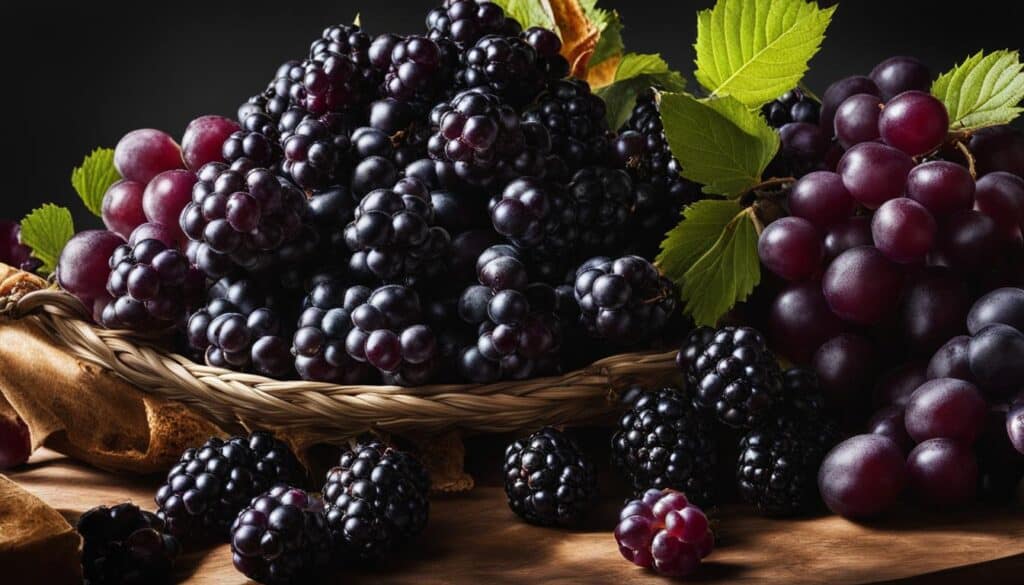
Embarking on a journey to explore the wonders of black fruit is an invitation to indulge in a world of unique flavors and culinary delights. The black fruit category offers a remarkable variety that guarantees an exciting taste exploration.
From the magical taste alteration of the miracle fruit to the jam-like goodness of the peanut butter fruit and the olive-like flavor of the dabai fruit, each black fruit presents its own distinctive experience. Whether you are a culinary adventurer seeking new flavors or a health-conscious individual making mindful choices, black fruit is a fascinating addition to your journey.
With a range of black fruit options to choose from, you can add a burst of color, flavor, and nutrition to your meals. Incorporate black fruit into your diet to enjoy the benefits of variety and enhance your culinary adventures. From refreshing smoothies and vibrant salads to delicious desserts and homemade jams, black fruit offers endless possibilities to elevate your taste buds.
Black Fruit Variety Table:
| Black Fruit | Taste Profile | Common Uses |
|---|---|---|
| Miracle Fruit | Tastes sour foods as sweet | Natural sweetener, flavor enhancer |
| Peanut Butter Fruit | Sweet, floral, slightly bitter | Spread, jam substitute |
| Dabai Fruit | Buttery, olives, brie cheese | Eaten raw, cooking oil |
Incorporating black fruit into your lifestyle not only adds enjoyment to your meals but also provides a range of health benefits. With their rich antioxidant content, black fruits can support your overall well-being as part of a balanced diet. So why not savor the delights of black fruit and embark on a flavor-filled, health-conscious journey today?
Conclusion
As I conclude my exploration of black fruit, I am truly amazed by the benefits, flavors, and versatility they offer. Black fruit is not only delicious but also packed with essential nutrients, making it a valuable addition to any diet.
From the miracle fruit with its extraordinary taste-altering properties to the peanut butter fruit’s jam-like goodness and the unique flavors of the dabai fruit, each black fruit variety has something special to offer. Whether you enjoy them fresh, incorporate them into recipes, or indulge in their jam form, black fruits can elevate your culinary experiences in exciting ways.
What’s more, black fruit’s rich antioxidant content contributes to potential health benefits, such as preventing diseases and reducing inflammation. By adding black fruit to your meals, you can make health-conscious choices without compromising on taste.
So, embrace the wonders of black fruit and embark on a journey of taste exploration, culinary creativity, and well-being. Whether you’re looking for a nutritious snack, a delightful dessert, or a unique addition to your smoothies and salads, black fruit is sure to satisfy your palate and nourish your body. Start incorporating black fruit into your daily routine and experience the countless benefits it has to offer!
FAQ
What are the health benefits of black fruit?
Black fruit is packed with antioxidants, vitamins, and fiber, which contribute to various health benefits. It can support the immune system, promote heart health, aid digestion, and provide essential nutrients.
Where are black fruits typically grown?
The availability and seasonality of black fruits vary depending on the region and climate. Some black fruits are available year-round, while others have specific seasons. Tropical and exotic fruits often fall into the black fruit category.
How can black fruit be used in recipes?
Black fruit can be a versatile ingredient in various culinary creations. It can be used in desserts like pies and tarts, added to smoothies and salads, or used to make delicious jams perfect for spreading on toast or pairing with cheese.
What are the nutritional benefits of black fruit?
Black fruit is rich in antioxidants, vitamins, and fiber, which contribute to overall health and well-being. Antioxidants help neutralize free radicals and reduce inflammation, which may play a role in preventing chronic diseases.
What are some types of black fruit?
There are various types of black fruit, including the miracle fruit, peanut butter fruit, and dabai fruit. Each offers its own unique taste experience and culinary potential.
How do black fruits taste?
The taste of black fruits can vary widely. Miracle fruit can make sour foods taste sweet, peanut butter fruit has a sweet, floral, and slightly bitter flavor, and dabai fruit has a taste reminiscent of buttered carrots with hints of olives and brie cheese.

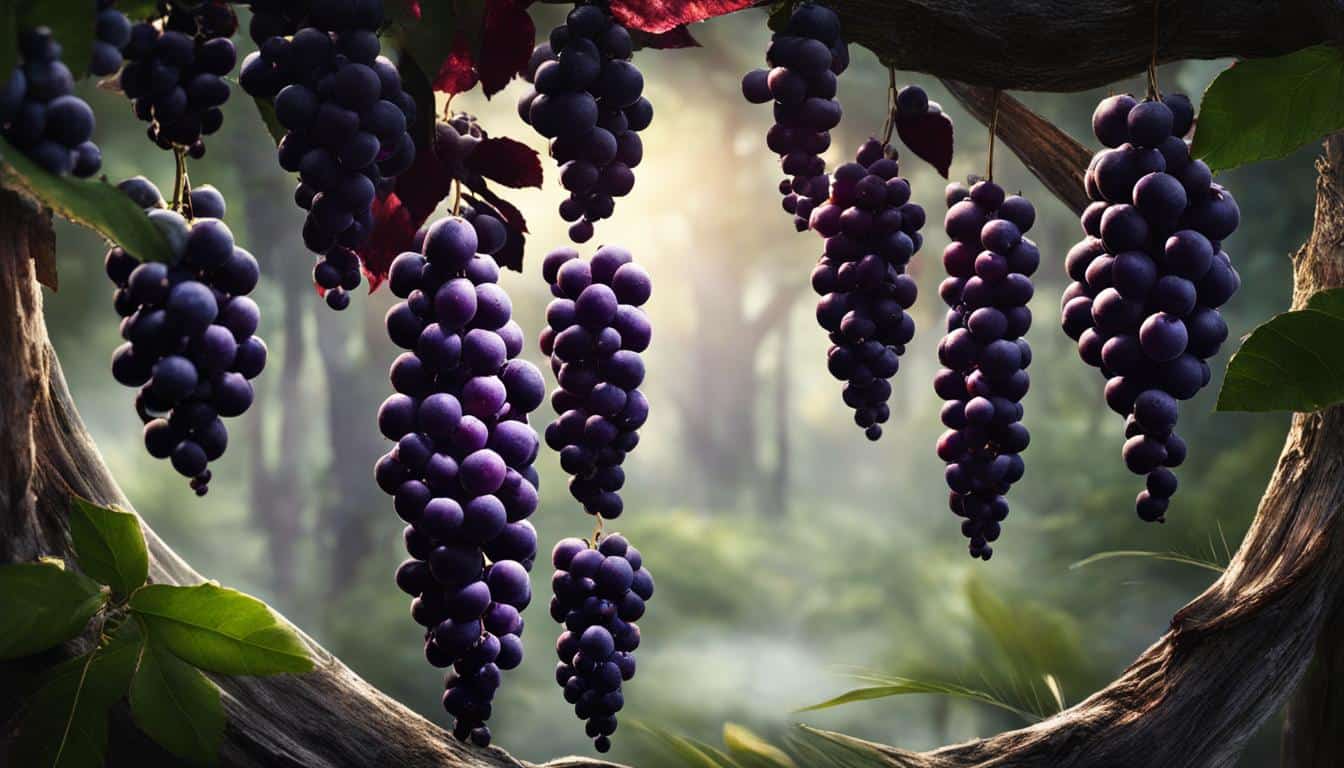



Leave a Reply